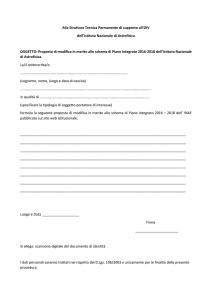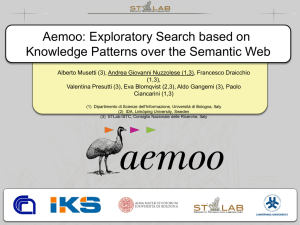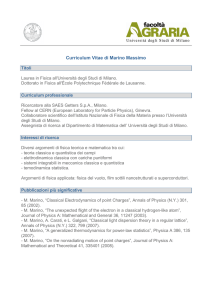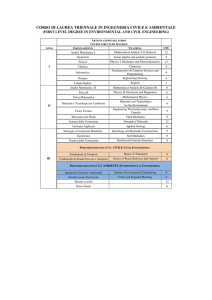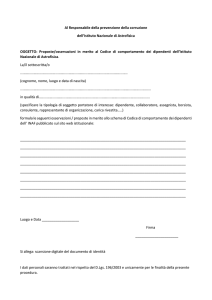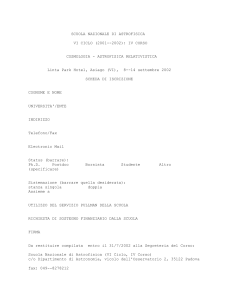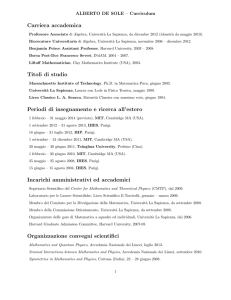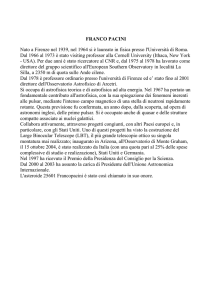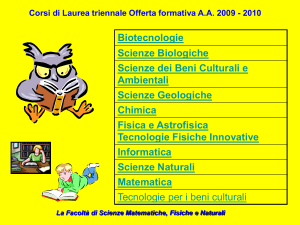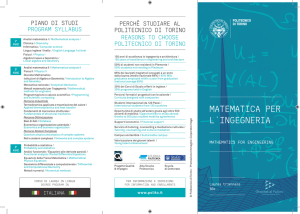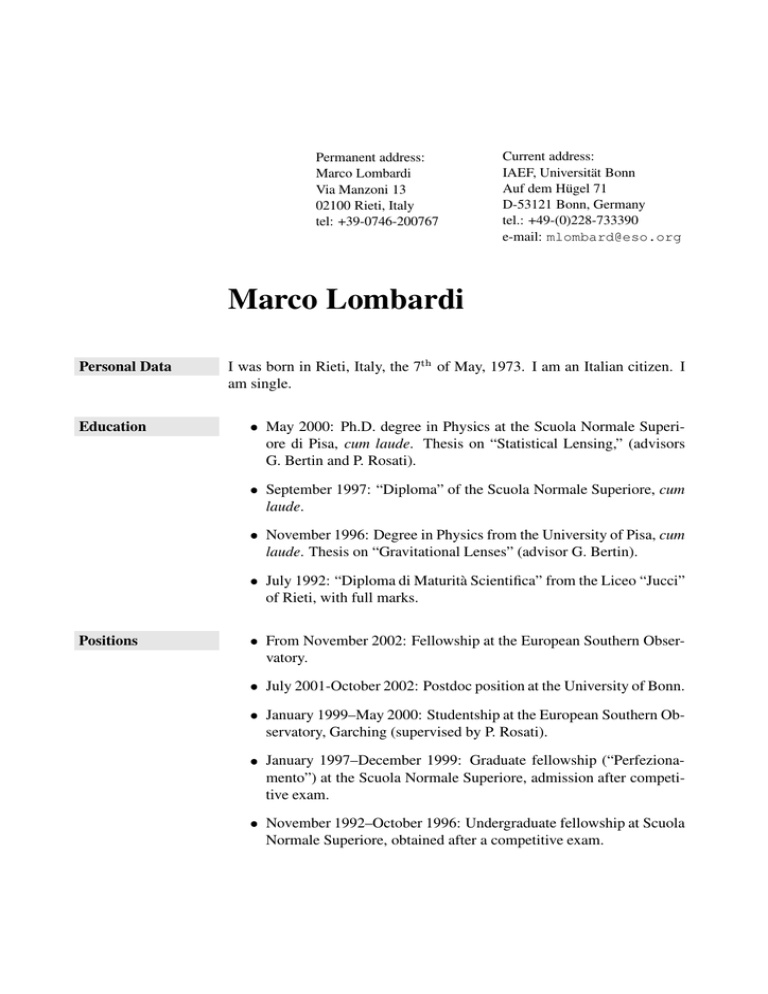
Permanent address:
Marco Lombardi
Via Manzoni 13
02100 Rieti, Italy
tel: +39-0746-200767
Current address:
IAEF, Universität Bonn
Auf dem Hügel 71
D-53121 Bonn, Germany
tel.: +49-(0)228-733390
e-mail: [email protected]
Marco Lombardi
Personal Data
I was born in Rieti, Italy, the 7
am single.
of May, 1973. I am an Italian citizen. I
May 2000: Ph.D. degree in Physics at the Scuola Normale Superiore di Pisa, cum laude. Thesis on “Statistical Lensing,” (advisors
G. Bertin and P. Rosati).
September 1997: “Diploma” of the Scuola Normale Superiore, cum
laude.
November 1996: Degree in Physics from the University of Pisa, cum
laude. Thesis on “Gravitational Lenses” (advisor G. Bertin).
July 1992: “Diploma di Maturità Scientifica” from the Liceo “Jucci”
of Rieti, with full marks.
From November 2002: Fellowship at the European Southern Observatory.
July 2001-October 2002: Postdoc position at the University of Bonn.
January 1999–May 2000: Studentship at the European Southern Observatory, Garching (supervised by P. Rosati).
January 1997–December 1999: Graduate fellowship (“Perfezionamento”) at the Scuola Normale Superiore, admission after competitive exam.
November 1992–October 1996: Undergraduate fellowship at Scuola
Normale Superiore, obtained after a competitive exam.
Education
Positions
1997: Gravity Research Foundation, Honorable Mention.
1992: First place in National Physics Olympiad. Bronze medal at
the International Mathematical Olympiad held in Helsinki.
1992: Second place in National Mathematical Olympiad (more than
competitors). Bronze medal at the International Mathematical Olympiad held in Moscow.
1991: Third place in National Mathematical Olympiad. Member of
the Italian team for the International Mathematical Olympiad held in
Stockholm.
Awards
Research
My scientific interests are mainly related to gravitational lenses. At present,
I work on weak lensing in clusters of galaxies. From a theoretical point of
view, I have discussed in detail the methods and the noise properties of
lensing mass reconstructions (see [2, 3, 12] in the list of publications). In
particular, I have shown that the reconstruction method known as “noisefiltering” produces optimal reconstructions, i.e. mass maps with the largest
signal-to-noise ratio; I have also provided a new, very fast numerical implementation of that method based on a simple variational principle [6].
Moreover, I have outlined two new applications: determination of cosmological parameters from weak lensing observations [4] and detection of the
coupling effect of a double lens [7]. From an observational point of view, I
have detected a weak lensing signal in distant galaxy clusters observed by
VLT [8].
A second research interest involves molecular clouds. In particular, from
an observational point of view, I have produced wide field extinction maps
of cloud complexes using an optimized, multi-band technique [11]. I also
have focused on stability issues of cloud cores, generalizing a classical
results to non-symmetric cores [10].
Recently, I have also considered from a statistical point of view the interpolation of discrete data into a smooth field [9, 14, 15]. This problem,
which occurs very often in Astronomy, has been solved exactly for a large
family of interpolation techniques (linear interpolators).
I collaborate with The Astrophysical Journal Letters and Astronomy &
Astrophysics as a referee.
Teaching
In April 2002 I held a brief course (10 hours of class) on Astrophysical
applications of General Relativity at the Physics Department of the University of Milan addressed to graduate students.
Computer Skills
I have carried out scientific projects using many different languages, from
Pascal, to C/C++, Fortran, Java, LISP, Haskell. Besides, I have some notions of data bases and experience in lexical analyzers and parser generators. I also have several years of experience as system manager on Unix
machines (in particular on the Unix-like operating systems AIX, Solaris
and Linux).
Data reduction
In the last years, I have acquired familiarity with image manipulation and
data reduction tools, such as IDL, IRAF, SExtractor, and IMCAT (used for
the lensing analysis).
International
Exposure
I speak English and French fluently and I have a basic knowledge of German. My scientific visits include:
January 1999–May 2000: European Southern Observatory, Garching, Germany.
August 1995: Max-Planck-Institut für Astrophisik, Garching, Germany.
September 1994: École Normale Supérieure, Paris, France.
STScI May Symposium, 6 May 1997, “Hubble Deep Field,” Space
Telescope Science Institute, Baltimore, Maryland
Scuola Nazionale di Astrofisica, 26–30 May 1997, “Galaxies; Solar
and Stellar Physics,” Catania, Italy
Scuola Nazionale di Astrofisica, 8–13 September 1997, “New Telescopes; Cosmology,” Asiago, Italy
Scuola Nazionale di Astrofisica, 15–20 June 1998, “Physics of the
Solar System; Relativistic Astrophysics,” Osservatorio Astronomico
di Roma, Monte Porzio Catone, Italy
International Workshop on “Observational Cosmology: The Development of Galaxy Systems,” 30 June–3 July 1998, Sesto Pusteria,
Bolzano, Italy
XIX Texas Symposium on Relativistic Astrophysics and Cosmology,
14–18 December 1998, Paris, France (oral presentation)
Workshops, Schools,
and Conferences
Personal Interests
Lincei International Workshop on “Structure and Dynamics of Galaxies,” 18–19 March 1999, Venezia, Italy (oral presentation)
“Gravitational Lensing: Recent Progress and Future Goals,” 25–30
July 1999, Boston, Massachusetts
Scuola Nazionale di Astrofisica, 20–25 September 1999, “Global
Properties of Galaxies; Space Instrumentation,” Marciana Marina
(Livorno), Italy
“Energy Densities in the Universe,” 22–29 January 2000, Les Arcs,
France
“Cosmological Physics with Gravitational Lensing,” 11–18 March
2000, Les Arcs, France
ESO Symposium “The Origin of Stars and Planets: The VLT View,”
24–27 April 2001, Garching, Germany
International conference “Where is the matter? Tracing Dark and
Bright Matter with the New generation of Large Scale Surveys,” 25–
29 June 2001, Marseille, France
Invited talk “Gravitational Lenses” at the Physics department of the
University of Milan, 24 September 2001
International converence “The Cosmological Model,” 16–23 March
2002, Les Arcs, France
Invited talk “Gravitational Lenses” at the Scuola Normale Superiore,
Pisa, Italy, 28 May 2002
“Gravitatational Lenses 2002,” 15–19 July 2002, Ringberg, Germania
“NATO advanced study institute on Optics in Astrophysics,” 16–27
September 2002, Cargese, Francia
I love traveling and spending time in different places. I like playing piano
and violin, and listening to classical music. I practice several sports: skiing, swimming, wind-surfing, and SCUBA diving. During the summer I
practice some mountaineering and speleology.

